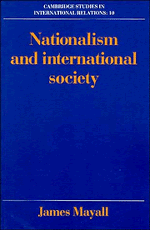Book contents
- Frontmatter
- Contents
- Acknowledgements
- Introduction
- 1 The search for the international system: the problem of theory
- 2 The society of states
- 3 Nationalism and the creation of states
- 4 Nationalism and the international order
- 5 Economic nationalism and the liberal world order
- 6 The new economic nationalism
- 7 Post-colonial nationalism
- 8 The third world and international society
- Conclusion
- Notes
- Index
Conclusion
Published online by Cambridge University Press: 05 July 2011
- Frontmatter
- Contents
- Acknowledgements
- Introduction
- 1 The search for the international system: the problem of theory
- 2 The society of states
- 3 Nationalism and the creation of states
- 4 Nationalism and the international order
- 5 Economic nationalism and the liberal world order
- 6 The new economic nationalism
- 7 Post-colonial nationalism
- 8 The third world and international society
- Conclusion
- Notes
- Index
Summary
The two central claims of this book can be briefly stated. First, the primacy of the national idea amongst contemporary political principles has modified the traditional conception of an international society but has not replaced it. Second, there is no immediate prospect of transcending the national idea, either as the principle of legitimisation or as the basis of political organisation for the modern state. Hence, for the time being, international society cannot develop in ways which are inconsistent with the continued existence of separate national states. Islands of supra-national authority may arise here and there, but the principle of popular sovereignty will not easily translate into supra-nationalism in general.
To summarise the argument which supports these claims let us return to the three questions that were raised in the Introduction. What is meant by international society? On what normative principles is the idea of international society based? How has nationalist doctrine, and more broadly the national idea, influenced its evolution? I shall consider each briefly in turn.
The original conception of international society has survived into the modern world with its basic structure intact. It is a conception of a society of states which recognise each other's sovereignty, engage in regular diplomatic relations with one another and uphold international law. The theoretical alternatives to this scheme have not materialised. These are some form of world empire or dominion, or the evolution of political arrangements designed with reference to a community of mankind, rather than separate national communities.
- Type
- Chapter
- Information
- Nationalism and International Society , pp. 145 - 152Publisher: Cambridge University PressPrint publication year: 1990



